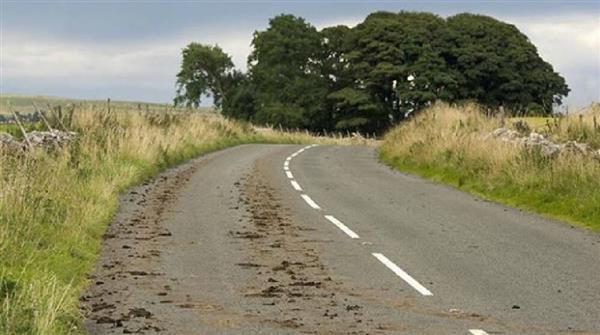|
||||
|
||||
|
|
||||
|
Dear resident,
Due to several reports in relation to mud on roads, here is a reminder of the obligations of all those that use agricultural machinery and advice for other road users. Anyone using the rural road network in our region should appreciate that we do live in a rural area and as such this means sharing the highway with numerous types of agricultural vehicles. It’s important, especially during the spring and towards the end of the summer at harvest time, that motorists are aware of the dangers that may be present as farmers use the roads more. Extra care and patience should be taken during any time of year to reduce risk by not making dangerous man Agriculture is one of our region’s major industries and the use of public roads by agricultural machinery is a necessity for many in the industry. The road network is of fundamental importance to this industry but farming activity can have a significant effect on the flow and appearance of our rural roads. Mud on the roads Excess mud or debris on the roads can cause a danger to cars, motorbikes and cyclists and can drastically change the way a vehicle handles causing skidding, especially in wet conditions. It can also cause localised flooding on the highway/blocked drains. Mud on the road is the subject of frequent complaints made by the public and is often as a result of mud on tyres during harvest time, animals being herded across a road or mud run off from fields. It is an offence under the Highways Act 1980 to allow mud or debris from adjacent land to fall, be washed or carried onto a public road and can lead to prosecution. We appreciate that we live in a rural area and unfortunately mud and agriculture go together but there are things that can be done to avoid any issues. Try to programme and organise your work to deal with the problem before it occurs by cleaning mud from vehicles before they enter the highway, this will also include 4x4’s, gators and quad bikes. On some occasions if this can’t be avoided it is a farmer or contractor’s duty to ensure this is cleaned. In this case it is important to inform the local highway authority to seek advice. Hedge and tree cutting Each landowner is responsible for foliage growth that overhangs the highway. Trees or hedges that are left uncut can interfere with traffic and also obscure signs. Visibility can also be reduced at junctions and bends. Generally you must not cut or trim any hedges between 1st March – 1st September so as not to interfere with the main breeding season for birds. Any works that are undertaken should be undertaken safely and in accordance with the Traffic Signs Manual which outlines the correct warning signs that must be used. Signs should be placed well in advance of the work and must be visible for all road users. Agricultural machinery As with other vehicles on the public highway all tractors and equipment should always be in a good state of repair and in a roadworthy condition. Each tractor or equipment must have the proper lighting to be driven on a public road and should be used in dusk or in times of poor visibility. When towing, make sure that the towing eye on the trailer is not excessively worn and that the tractor hitch lock is locked into place. Drivers of slow moving vehicles should always be aware of the build-up of traffic behind them and, when convenient and safe, pull over to allow traffic to pass. This avoids motorists taking unnecessary risks. Drivers of these vehicles are also reminded that weight limits on roads also apply to agricultural vehicles, not just goods vehicles. Any operators of agricultural vehicles should be skilled and familiar with their vehicle. As with all other motor vehicles it is a criminal offence to use a mobile phone when behind the wheel of an agricultural vehicle.
Kind regards
| ||||
Reply to this message | ||||
|
||||
|
|
||||

|
|






